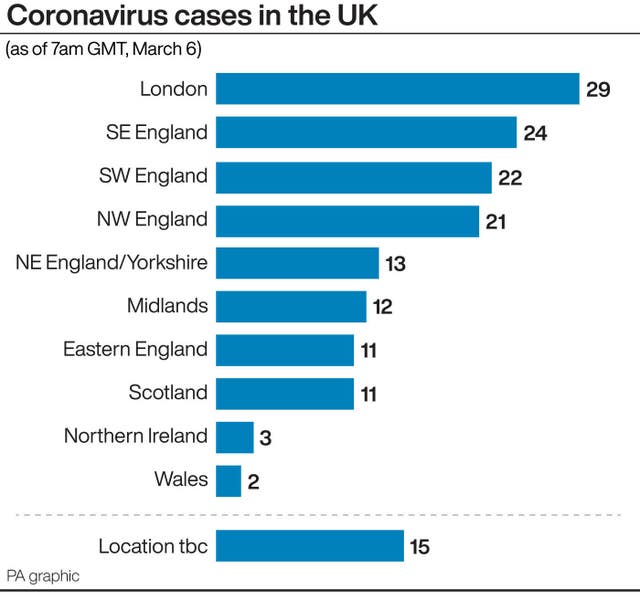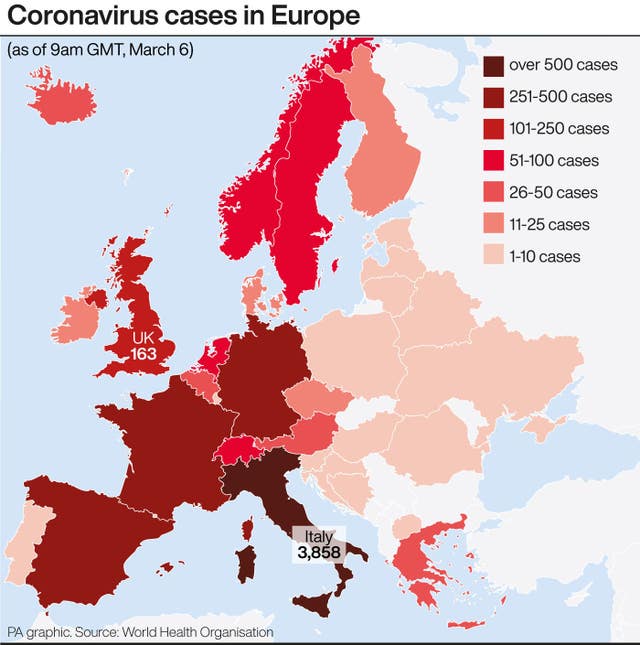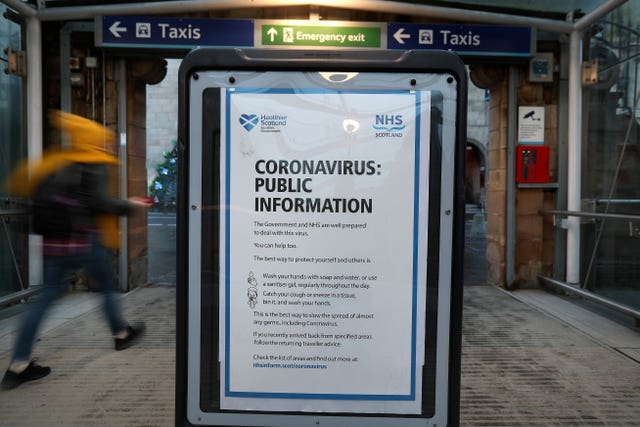OAP dies after positive coronavirus test as ‘social distancing’ policies loom
The man, who had underlying health conditions, died on Thursday while being treated at Milton Keynes University Hospital.

A man in his early 80s has become the second person to die in the UK after testing positive for coronavirus.
The man, who had underlying health conditions, died on Thursday while being treated at Milton Keynes University Hospital.
It comes as Government ministers are next week expected to advise elderly people to visit relatives now before “social distancing” policies are introduced.
British pensioners could be warned to stay at home and will likely be told to avoid crowded areas, the Daily Telegraph reported.
Meanwhile, ministers are said to be in talks with retailers and delivery companies about providing supplies to vulnerable people who are self-isolating, the newspaper reported.
As of 9am on Friday, 163 people had tested positive for Covid-19 – up from 115 cases reported at the same time on Thursday.
Northern Ireland then confirmed its fourth case later on Friday, bringing the total to 164.
Milton Keynes University Hospital NHS Foundation Trust confirmed on Friday night that a man in his early 80s died shortly after testing positive for coronavirus.
In a statement, the trust said: “His family has been informed and our thoughts and condolences are with them at what is undoubtedly a difficult and distressing time.
“The hospital continues to work with Public Health England to isolate any patients or staff who had contact with the patient.”
The trust said all services and appointments at the hospital were “running normally” and that it was following advice to minimise the risk of the virus spreading.
Chief medical officer Professor Chris Whitty said work was already under way to establish who the man had come into contact with.
He said: “I offer my sincere condolences to their family and friends and ask that their request for privacy is respected.
“The patient, who was being treated at the Milton Keynes University Hospital, was an older patient who had underlying health conditions. Contact tracing is already under way.”

On Thursday evening another patient, reported to be a woman in her 70s, became the first person in the UK to die after being diagnosed with Covid-19 while at the Royal Berkshire Hospital in Reading.
The deputy chief medical officer, Jenny Harries, said that discussions about how to help older people are ongoing.
She told Sky News: “One of the important parts of that is not just about the recommendation or not to isolate, but actually ensuring that they have all of the supplies and care that they need.”
Last week, a British tourist who had been on board the Diamond Princess cruise ship, which was quarantined in Japan, became the first UK citizen to die after testing positive for the virus.
In other developments:
– Facebook closed its London office for deep cleaning after a Singapore-based employee who had visited tested positive.
– Former Scottish Government official Professor June Andrew said a coronavirus pandemic would be “quite useful” as it would take out hospital bed blockers, even though it was a “horrific” thing to say.
– Dr Mike Ryan, from the World Health Organisation (WHO), said it was “a false hope” that coronavirus would disappear in the summer like flu.
– A 43-year-old British businessman was confirmed with Covid-19 in Thailand, and the Vatican confirmed its first case.
– A church in Devon closed after a parishioner was diagnosed with coronavirus, while the Bhaktivedanta Manor Hare Krishna temple, near Watford, closed its doors after a member tested positive.
– Two members of British Airways staff tested positive. The PA news agency understands the staff are baggage handlers.
– Globally, the number of coronavirus cases has passed 100,000, including five new confirmed cases in Ireland, bringing the state’s total to 18. There have been 3,400 deaths worldwide.
– Prime Minister Boris Johnson visited a Bedfordshire laboratory as the Government pledged an extra £46 million for research into coronavirus vaccines and rapid diagnostic tests.
– The Royal College of Emergency Medicine cancelled its spring conference on continuing professional development in Bournemouth at the end of March.
– Jon Sparkes, chief executive of Crisis, said homeless people were at higher risk of coronavirus due to existing health conditions, the inability to wash their hands regularly and they may be unable to self-isolate if they become unwell.

Mr Johnson is due to chair a meeting of the government’s Cobra civil contingencies committee on Monday as it is now “highly likely” the infection will spread in a “significant way”, a No 10 spokesman said.
“Officials will therefore accelerate work on the delay phase of the Government’s plan,” the spokesman added.
Meanwhile, sports governing bodies and broadcasters have been called to a Government meeting to discuss how to deal with the outbreak’s possible impact on the sporting calendar.
The meeting is part of the Government’s long-term contingency planning and will cover various possibilities, such as holding events behind closed doors, should the virus continue to spread and gatherings of large numbers of people are banned.
It will be hosted by the Department for Digital, Culture, Media and Sport on Monday morning.

New blog posts from Public Health England (PHE) suggested people may need to get supplies for loved ones if social-distancing measures are brought in and more people are told to stay at home.
The posts urged people to “plan ahead”, adding: “Everyone has a part to play, and we’re asking people to think about what they do in a typical week, how they could limit contact with others if asked to, and how they could help people in their community who might need support if certain social-distancing measures were put in place.
“This might include helping older relatives and neighbours to get some food in, so that they would have supplies for a week or so if required, ensuring someone would be available to go shopping for them, or arranging for online delivery if they needed it.”
Prof Whitty has said half of all coronavirus cases in the UK are most likely to occur in just a three-week period, with 95% of them over a nine-week period.





